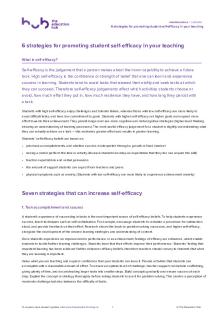Alburt Bandura and Self Efficacy PDF

| Title | Alburt Bandura and Self Efficacy |
|---|---|
| Course | Educational Psychology |
| Institution | Texas A&M University |
| Pages | 3 |
| File Size | 85 KB |
| File Type | |
| Total Downloads | 89 |
| Total Views | 155 |
Summary
Essay on Self Efficacy and Albert Bandura Research...
Description
Reflection According to psychologist Albert Bandura, who initially introduced the term, self-efficacy is a pe rsonal decision of”how well one can carry out the courses of action needed to deal with future cir cumstances." From multiple viewpoints, psychologists have examined self-efficacy (Albanese, Russo & Geller, 2019). Educator Kathy Kolbe continues, "Belief in innate abilities means appreciating the unique collection of cognitive capabilities of one. It also requires persistence and perseverance to conquer chal lenges that would interfere with the use of such innate abilities to achieve objectives." There is a strong impact on the academic career since self-efficacy increases the efficiency of learning new things and applying on right points. Higher the self-efficacy of a student, better is his or her growth in an academic career (Fong et al., 2018). Self-efficacy is thus directly proportional to academic growth. I have chosen this topic because of the fact that learning is one of the most essential growths of a child as soon as he or she joins school. However, from the day he or she learns to understand things, cognitive development begins. For this development, various modifications are needed which is well associated with the academic life of the child. Parents have been found to play a major role in this phenomena. From this point of view, it can be said that more is the efficiency of learning more is the effectiveness of a child in understanding things and being successful in life. Self-efficacy is one such tool by which one can grow better in any field. Since we are talking for elementary to middle school children, self-efficacy and estimation is needed at the maximum
level. This is because of the fact that during this time period, children learn a lot of things which are the key to their success in future. Not only school teachers but also parents are responsible for the same. For almost 10 hours, children stay at home and for the rest 6-10 hours they stay at school on an overall basis. Within this time period, children learn a lot of things and experience new ways of learning also. To guide children through their learning process and make them realise about their self-efficacy, parents play a major role. They assist their children in choosing the best way of learning which has the highest efficacy for a better growth in their academic career. In our school, we utilize various ways of learning to make the students adapt to new learning techniques and also assess them by taking quarterly examinations. This process allows us to check whether the children are learning properly with moderate to high self-efficacy or not. The same also makes the parents devise a better mode of education and learning for their children after observing the results after the examination.
References Albanese, A. M., Russo, G. R., & Geller, P. A. (2019). The role of parental self‐efficacy in parent and child well‐being: A systematic review of associated outcomes. Child: care, health and development, 45(3), 333-363. Benatov, J. (2019). Parents' feelings, coping strategies and sense of parental self-efficacy when dealing with children’s victimization experiences. Frontiers in psychiatry, 10, 700. Fong, H. F., Rothman, E. F., Garner, A., Ghazarian, S. R., Morley, D. S., Singerman, A., & BairMerritt, M. H. (2018). Association between health literacy and parental self-efficacy among parents of newborn children. The Journal of pediatrics, 202, 265-271. Mulyadi, S., Rahardjo, W., & Basuki, A. H. (2016). The role of parent-child relationship, self-esteem, academic self-efficacy to academic stress. Procedia-Social and Behavioral Sciences, 217, 603-608. Walters, G. D. (2020). Self-Efficacy in Parents and Children and Its Relationship to Future Delinquent Behavior in Children. Youth & Society, 0044118X20959230. Wittkowski, A., Dowling, H., & Smith, D. M. (2016). Does engaging in a group-based intervention increase parental self-efficacy in parents of preschool children? A systematic review of the current literature. Journal of Child and Family Studies, 25(11), 3173-3191....
Similar Free PDFs

Alburt Bandura and Self Efficacy
- 3 Pages

Self & Collective Efficacy
- 5 Pages

Career Self-Efficacy Scale
- 1 Pages

Banduras Theory of Self Efficacy
- 3 Pages

6. Bandura and Mischel Answers
- 6 Pages

Module 17 Albert Bandura
- 4 Pages

Modelllernen, Bandura
- 3 Pages

Bandura study
- 2 Pages
Popular Institutions
- Tinajero National High School - Annex
- Politeknik Caltex Riau
- Yokohama City University
- SGT University
- University of Al-Qadisiyah
- Divine Word College of Vigan
- Techniek College Rotterdam
- Universidade de Santiago
- Universiti Teknologi MARA Cawangan Johor Kampus Pasir Gudang
- Poltekkes Kemenkes Yogyakarta
- Baguio City National High School
- Colegio san marcos
- preparatoria uno
- Centro de Bachillerato Tecnológico Industrial y de Servicios No. 107
- Dalian Maritime University
- Quang Trung Secondary School
- Colegio Tecnológico en Informática
- Corporación Regional de Educación Superior
- Grupo CEDVA
- Dar Al Uloom University
- Centro de Estudios Preuniversitarios de la Universidad Nacional de Ingeniería
- 上智大学
- Aakash International School, Nuna Majara
- San Felipe Neri Catholic School
- Kang Chiao International School - New Taipei City
- Misamis Occidental National High School
- Institución Educativa Escuela Normal Juan Ladrilleros
- Kolehiyo ng Pantukan
- Batanes State College
- Instituto Continental
- Sekolah Menengah Kejuruan Kesehatan Kaltara (Tarakan)
- Colegio de La Inmaculada Concepcion - Cebu







